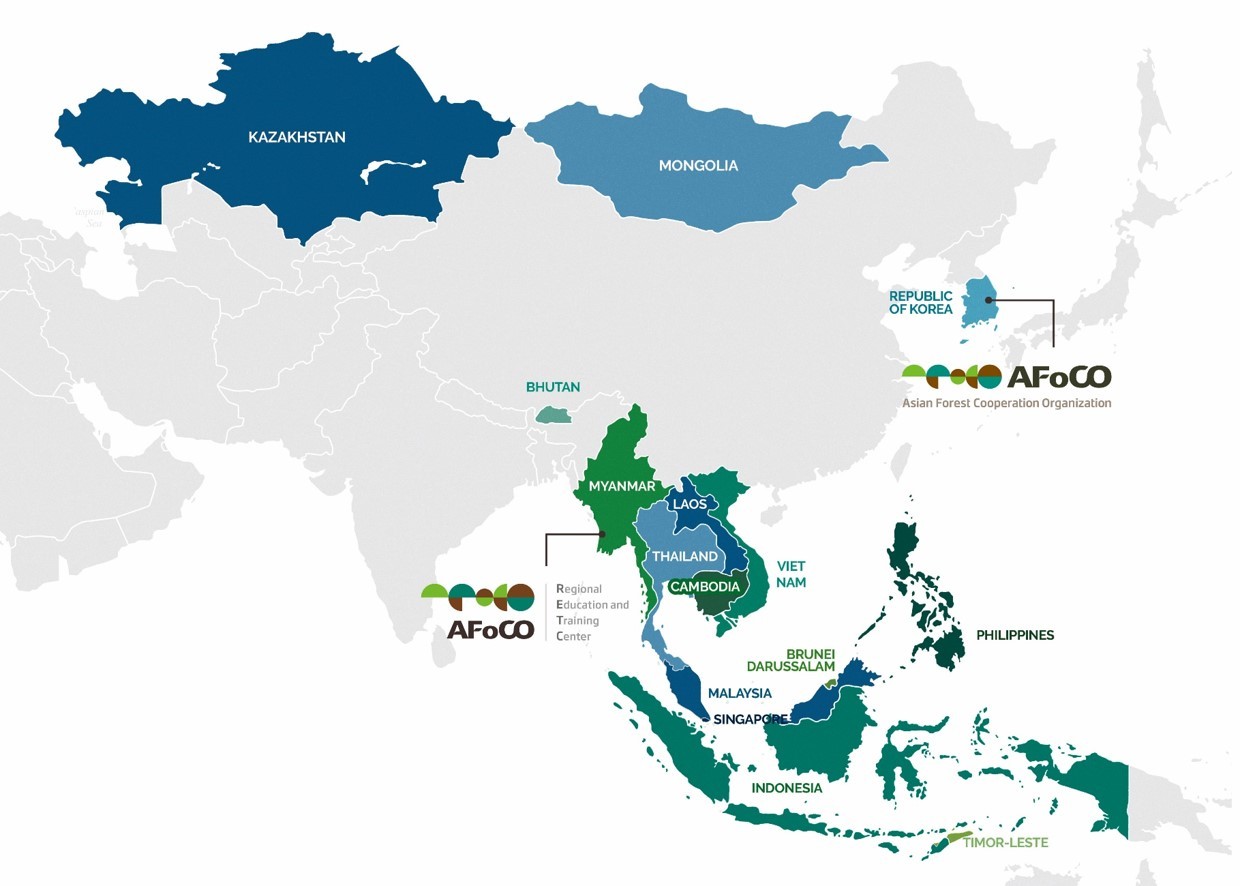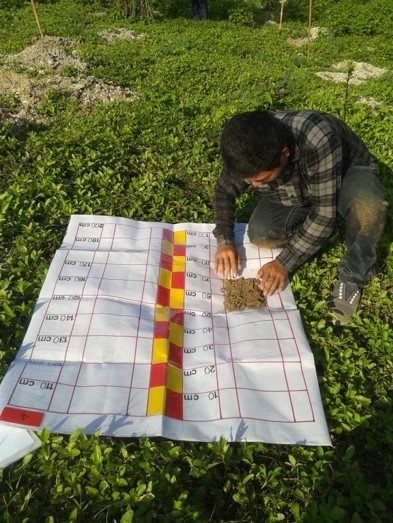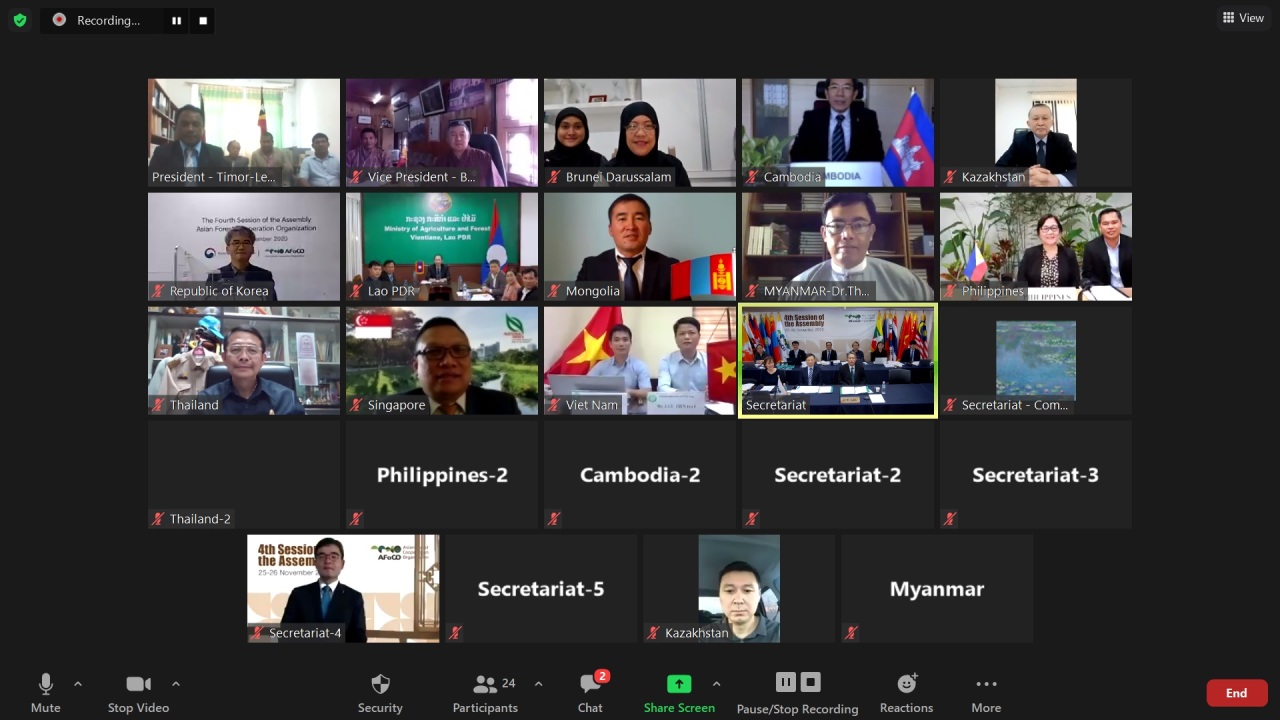AFoCO views forest cooperation as key to battle climate and pandemic crisis
Asia tackles the transnational risks of climate and pandemic through AFoCO
By Gha Hee sunPublished : Jan. 28, 2021 - 16:44

Ricardo Calderon, the executive director of the Asian Forest Cooperation Organization (AFoCO), has welcomed the Korean government’s announcements on plans for carbon neutrality by 2050.
President Moon Jae-in announced last October that South Korea will seek to reach carbon neutrality by 2050 in an effort to transform the country’s fossil-fuel reliant economy into an eco-friendly one.
The Korean Forest Service announced its 2050 Carbon Neutral Forestry Sector Strategy this month, which aims to reduce 34 million tons of carbon by planting 3 billion trees at home and abroad by 2050. Korea is already recognized for its experiences in forest restoration and the strategy will bring another dimension of the forest sector into the limelight.
Through existing bilateral and multilateral platforms, Korea’s model will contribute to maximizing the forest sector’s contribution to encourage carbon neutrality commitments in other countries.
Focusing on forest sectors is key in striving for a greener, more sustainable Asia.
“Curbing deforestation is a highly cost-effective way of reducing greenhouse gas emissions. Emissions from deforestation are very significant -- they are estimated to represent more than 18 percent of global emissions, a share greater than is produced by the global transport sector,” the Stern Review on Economics and Climate Change noted in 2006.
Deforestation also poses a great threat in increased pandemic risks. The United Nations Environment Program shows that one-third of the emerging epidemics are caused by forest degradation.
AFoCO, an intergovernmental organization, was established in 2009 after being proposed by South Korea at the ASEAN-ROK Commemorative Summit in 2009. Now with 15 member countries in Asia, it addresses climate change and sustainable development through strengthening regional forest cooperation.
Calderon, who took office in January, is currently tasked with dealing with the challenges of climate change and COVID-19 recovery through forestry.
The members of AFoCO are key to the success of the Moon administration’s New Southern Policy, an initiative to bolster Seoul’s strategic and economic relations with Southeast Asian countries, as the organization has been a channel to translate policies into actions in most needed places.
Field projects include promoting sustainable forest management practices, maintaining healthy ecosystem services, addressing climate change and its impacts through REDD+ initiatives, forest landscape restoration and building resilience against forest-related disasters including fires in over 30 project sites in the 10 ASEAN countries, Bhutan, Kazakhstan and Timor-Leste.
President Moon Jae-in announced last October that South Korea will seek to reach carbon neutrality by 2050 in an effort to transform the country’s fossil-fuel reliant economy into an eco-friendly one.
The Korean Forest Service announced its 2050 Carbon Neutral Forestry Sector Strategy this month, which aims to reduce 34 million tons of carbon by planting 3 billion trees at home and abroad by 2050. Korea is already recognized for its experiences in forest restoration and the strategy will bring another dimension of the forest sector into the limelight.
Through existing bilateral and multilateral platforms, Korea’s model will contribute to maximizing the forest sector’s contribution to encourage carbon neutrality commitments in other countries.
Focusing on forest sectors is key in striving for a greener, more sustainable Asia.
“Curbing deforestation is a highly cost-effective way of reducing greenhouse gas emissions. Emissions from deforestation are very significant -- they are estimated to represent more than 18 percent of global emissions, a share greater than is produced by the global transport sector,” the Stern Review on Economics and Climate Change noted in 2006.
Deforestation also poses a great threat in increased pandemic risks. The United Nations Environment Program shows that one-third of the emerging epidemics are caused by forest degradation.
AFoCO, an intergovernmental organization, was established in 2009 after being proposed by South Korea at the ASEAN-ROK Commemorative Summit in 2009. Now with 15 member countries in Asia, it addresses climate change and sustainable development through strengthening regional forest cooperation.
Calderon, who took office in January, is currently tasked with dealing with the challenges of climate change and COVID-19 recovery through forestry.
The members of AFoCO are key to the success of the Moon administration’s New Southern Policy, an initiative to bolster Seoul’s strategic and economic relations with Southeast Asian countries, as the organization has been a channel to translate policies into actions in most needed places.
Field projects include promoting sustainable forest management practices, maintaining healthy ecosystem services, addressing climate change and its impacts through REDD+ initiatives, forest landscape restoration and building resilience against forest-related disasters including fires in over 30 project sites in the 10 ASEAN countries, Bhutan, Kazakhstan and Timor-Leste.

Malaysia and Thailand have a joint project based on the research in the restoration of ex-mine areas to preserve endangered species by introducing and domesticating endangered species.
Participatory projects are important mechanisms in recognizing forest management at the local level. Many members of AFoCO are practicing and upscaling such forest management policies.
Philippines is implementing a project to establish a forest resource management system using GIS/RS technology with village union members. The Philippine government will use this system as a national forest resource database.
With the project, a long-term plan is being developed to integrate the forest resources management from the national level to the local level. In Vietnam, a participatory approach is applied for the mangrove restoration and management project of nearly 1,000ha.
This year, AFoCO will be embarking on new activities.
In Bhutan, the only carbon-negative country in the world, a project that aims to identify and establish a model for local livelihood improvements through forest-related activity will begin.
Upscaling of the community-based forest management in the Philippines will be implemented through vertical integration in wood processing and development of market links.
Timor-Leste will start standardizing agroforestry models in different zones.
Research activities in partnership with research institutes of AFoCO members will continue, including the resistance on gall-forming insects in Kazakhstan.
Participatory projects are important mechanisms in recognizing forest management at the local level. Many members of AFoCO are practicing and upscaling such forest management policies.
Philippines is implementing a project to establish a forest resource management system using GIS/RS technology with village union members. The Philippine government will use this system as a national forest resource database.
With the project, a long-term plan is being developed to integrate the forest resources management from the national level to the local level. In Vietnam, a participatory approach is applied for the mangrove restoration and management project of nearly 1,000ha.
This year, AFoCO will be embarking on new activities.
In Bhutan, the only carbon-negative country in the world, a project that aims to identify and establish a model for local livelihood improvements through forest-related activity will begin.
Upscaling of the community-based forest management in the Philippines will be implemented through vertical integration in wood processing and development of market links.
Timor-Leste will start standardizing agroforestry models in different zones.
Research activities in partnership with research institutes of AFoCO members will continue, including the resistance on gall-forming insects in Kazakhstan.

Moreover, AFoCO agreed with World Agroforestry and Center for International Forestry Research (CIFOR-ICRAF), and the Global EverGreening Alliance on a landmark partnership to restore drylands and drought-prone areas in Asia.
The Landscape Partnership for Asia aims to achieve food security, climate mitigation and adaptation, biodiversity conservation, social equity, bioenergy, governance and economic growth, prevention of more land degradation, storing substantial amounts of carbon and increasing biodiversity.
It will deploy proven and cost-effective solutions, which will be expanded to a large scale. The solutions include, farmer-managed and assisted natural regeneration; agroforestry; sustainable forest, land, rangeland and water management; bioenergy production; financial instruments; and value-chain development with accompanying social-equity and institutional capacity building.
These solutions will help mitigate the climate crisis, build agricultural and environmental resilience, and improve livelihoods through development of small-to-medium enterprises and value chains.
AFoCO, as the secretariat of the partnership, looks forward to emphasizing the importance of cooperation between governments, research and development organizations, the private sector, multi-sectoral platforms, civil-society networks and community-based associations.
“This Partnership will empower rural communities to really own and benefit from more sustainable landscape management well beyond the end of the Partnership in 2032.”
Inviting specialist expertise from Africa and other dryland regions, new knowledge will be shared across Asia to establish a coherent body of “green, blended development” on lands that will sustain further expansion.
The partnership is to implement a trans-Asia monitoring and evaluation system that helps national governments to measure progress and feed these achievements into international commitments, linking to other restoration initiatives such as the Bonn Challenge, the Decade of Ecosystems Restoration and the Forest Landscape Restoration program from Food and Agriculture Organization of the United Nations for Asia-Pacific.
AFoCO was also recently granted Observer status at the UN General Assembly. Through ongoing and future activities, it is expected to contribute to restoring the forest loss and strengthening forest cooperation to attain larger, more global goals.
The organization will contribute further by providing insights and best, on-the-ground practices in addressing climate change and contributing to post COVID-19 effects through the forest sector, which are all linked directly to the cross-sectoral areas of community livelihood, watershed management and life on land, in particular.
By Gha Hee sun and Lee Kwon-hyoung (lizka98@heraldcorp.com) (kwonhl@heraldcorp.com)
The Landscape Partnership for Asia aims to achieve food security, climate mitigation and adaptation, biodiversity conservation, social equity, bioenergy, governance and economic growth, prevention of more land degradation, storing substantial amounts of carbon and increasing biodiversity.
It will deploy proven and cost-effective solutions, which will be expanded to a large scale. The solutions include, farmer-managed and assisted natural regeneration; agroforestry; sustainable forest, land, rangeland and water management; bioenergy production; financial instruments; and value-chain development with accompanying social-equity and institutional capacity building.
These solutions will help mitigate the climate crisis, build agricultural and environmental resilience, and improve livelihoods through development of small-to-medium enterprises and value chains.
AFoCO, as the secretariat of the partnership, looks forward to emphasizing the importance of cooperation between governments, research and development organizations, the private sector, multi-sectoral platforms, civil-society networks and community-based associations.
“This Partnership will empower rural communities to really own and benefit from more sustainable landscape management well beyond the end of the Partnership in 2032.”
Inviting specialist expertise from Africa and other dryland regions, new knowledge will be shared across Asia to establish a coherent body of “green, blended development” on lands that will sustain further expansion.
The partnership is to implement a trans-Asia monitoring and evaluation system that helps national governments to measure progress and feed these achievements into international commitments, linking to other restoration initiatives such as the Bonn Challenge, the Decade of Ecosystems Restoration and the Forest Landscape Restoration program from Food and Agriculture Organization of the United Nations for Asia-Pacific.
AFoCO was also recently granted Observer status at the UN General Assembly. Through ongoing and future activities, it is expected to contribute to restoring the forest loss and strengthening forest cooperation to attain larger, more global goals.
The organization will contribute further by providing insights and best, on-the-ground practices in addressing climate change and contributing to post COVID-19 effects through the forest sector, which are all linked directly to the cross-sectoral areas of community livelihood, watershed management and life on land, in particular.
By Gha Hee sun and Lee Kwon-hyoung (lizka98@heraldcorp.com) (kwonhl@heraldcorp.com)


















![[Today’s K-pop] Treasure to publish magazine for debut anniversary](http://res.heraldm.com/phpwas/restmb_idxmake.php?idx=642&simg=/content/image/2024/07/26/20240726050551_0.jpg&u=)